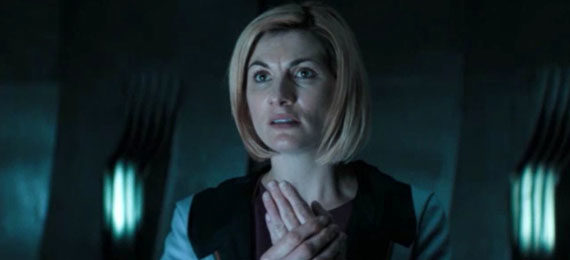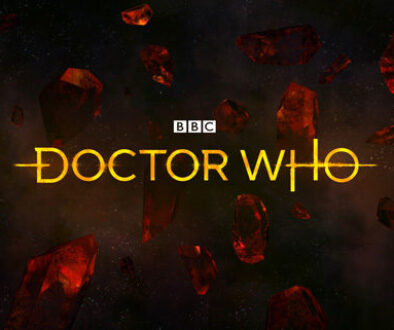“Demons of the Punjab” Review – “Rosa,” Revisited
Clint Hassell gives his spoiler-filled commentary on the sixth episode of Doctor Who Series 11.
Note: this review contains full SPOILERS for episode 6 of Series 11.

I just finished “Demons of the Punjab,” the latest episode of Doctor Who.
Me too! What did you think?
I’m conflicted. It’s both the type of story that I wish Doctor Who would do more of, and an underwhelming adventure.
That’s definitely a conflict!
I want episodes that resonate with the viewers because they are scripted by passionate writers with unique visions. I want stories that are reflective of a more diverse, global audience. I want Doctor Who to educate, and to comment on the human condition.
I think that describes “Demons of the Punjab.”
Yes, but I also want the episodes to be tautly scripted and engaging, and to utilize the show’s premise and its characters well.
So, you didn’t like the episode, but you can see the merit in what it tries to accomplish?
Yes, that’s probably fair. I can’t write an honest analysis without mentioning the script’s abundant problems, but I hate criticizing the work of a first-time Who writer who turned in a very personal script.
Let’s start with a compliment, then. What is something you think Vinay Patel’s script does well?
It made me learn about the Partition of India, which is not usually covered in history classes, here in the United States. “Demons of the Punjab” was my first exposure to the event.
That’s fantastic! Mr. Patel would probably be thrilled to know that his episode taught you about the event.
Yes, except it didn’t “teach” me. Aside from the Doctor’s statement that the Partition would cause “rioting in the cities, tens of millions of people . . . to be displaced, [and] more than a million . . . to die,” the episode is surprisingly light on information regarding the sociocultural environment in India that lead to this occurrence. It felt like the episode assumed I already knew the background details of the event. I didn’t, and so had to look online for the answers to the numerous questions I had.
Well, it’s a sci-fi TV show, not a history lecture! The point is to be entertaining, while hopefully also thought-provoking. The history is secondary.
Agreed. However, if your dialogue is so sparse that your audience has to look elsewhere for the information needed to place your story into appropriate historical context – – that’s bad scriptwriting. Worse, because the prevailing attitudes in India are not better explained, Manish seems one-dimensionally prejudiced against Muslims. It’s difficult to tell a layered story with shallow characters, so the message of the episode ends up being an over-simplified “prejudice is bad.”
Didn’t you say that “Rosa” suffered the same issue?
I did! (here) In many ways, “Demons of the Punjab” mirrors “Rosa”: Team TARDIS visits a point in history especially significant to one of the companions, due to their ethnic background. While there, prejudice is inescapable, and the Doctor and her friends are forced to watch idly as terrible events unfold – – to do the “wrong” thing for the “right” reasons. Characters are deified. Special music plays over the closing credits.

Maybe these similarities are part of the reason you feel unsatisfied by “Demons of the Punjab” – – it mines the same story beats as “Rosa,” hoping for the same emotional pay off, making “Demons of the Punjab” feel like a retread of a better episode?
Yes, probably.
Do you remember how we thought that “Rosa” seemed oddly placed in the middle of what was obviously meant to be a three-part reintroduction to Doctor Who consisting of “The Woman Who Fell to Earth,” “The Ghost Monument,” and “Arachnids in the UK”? What if “Rosa” was moved to third in broadcast order to separate it from the too-similar “Demons of the Punjab”?
That wouldn’t surprise me at all. There is precedent of that happening, in Series 4 and 6.
If it so closely follows the storyline from the stellar “Rosa,” then why is “Demons of the Punjab” so underwhelming?
“Demons of the Punjab” fails largely because it insists on incorporating an alien presence. The Thijarians are the worst edition to the Whoniverse in ages.
Since the Sandmen in “Sleep No More”?
Oh, at least. Now, you mentioned one of the “Episodes That Shall Not Again Be Discussed,” so, go put a dollar in the swear jar.

I didn’t understand the Thijarian mission. They state that they “travel beyond, seeking the unacknowledged dead, across all of time and space . . . to bear witness to those alone, [to] honor life as it passes.” Yet, all three times we encounter the Thijarians, they are either mourning a dead person that is neither “alone” or “unacknowledged,” or one that would be discovered only seconds later, had they not intervened.
Right?! Seems like a waste of the ability to traverse time and space, no? Why not spend those “100 generations” recovering as much of your lost culture as possible, rather than mourn someone else’s deceased?
Why were they initially identified as assassins? They look scary and seem to be threatening, even without the Doctor describing them as “the deadliest assassins in the known universe.”
There is definitely a trend of the alien threats being over-hyped, in Series 11. Tim Shaw of the Stenza warrior race, “conquerors of the Nine Systems”? Defeated in one night. “Toxic atmosphere” on Desolation? Not so much as a cough from the cast. The “fatally violent” Pting? It eats, like, three pieces of scrap and a bomb – – which actually saves everyone – – before being ejected into space. Each week, the narrative describes the monster using ridiculous hyperbole, but rarely delivers on the promise.
“Show, don’t tell,” no?
Exactly. The problem with the Thijarians is that they are red herrings – – the episode wastes a lot of time trying to convince the audience that they are the threat, only to reveal that they are not.
That time could’ve been used to further discuss the Partition.
Yes, or better explain Manish’s motivations.
“Demons of the Punjab” doesn’t trust its audience to have an adult, nuanced conversation about the nature of prejudice, or to appreciate a purely historical episode of Doctor Who, so, to pad out an episode otherwise short on plot, the Thijarians are introduced.
The real tragedy is that the episode focuses attention on the Thijarians to the exclusion of the companions. Ryan just disappears from this episode, and Graham offers little more than a pep talk to Yasmin.
Did you notice that the canister of glowing, purple dust only pops up from the center control console because Ryan was (again) randomly pushing alien buttons?

Yes! A fun continuation of that running gag.
Also, I appreciate that Graham’s comment to Yasmin – – “I honestly don’t know whether any of us know the real truth of our own lives, ‘cause we’re too busy living them from the inside. So just enjoy it, Yaz. Live this moment, and figure it out later” – – sounded like something Grace would have said. She had such a strong influence on Graham and Ryan, so, to see Grace also affect Yaz, even second-hand, is a nice through line.
Still, we are six episodes into a ten-episode series and Graham and Yaz are only just now having their first, substantive conversation.
Yeah, that’s the problem with three companions.
Further, look at this shot from the episode:

This is the moment that Yaz puts all of the pieces of the grandmother’s chronology in order, the briefest hint of a smile appearing as her eyes widen. The shot is exceptional, and would be a brilliant moment of character development, had it not been cut short by the editing.
OK, so there are some major problems in “Demons on the Punjab,” but you said you were “conflicted.” Did you find anything to love about the episode, aside from the scriptwriter’s passion for the historical setting?
I did, but it’s mostly a series of unrelated, but beautiful, background moments.
Gimme your list!
I like that the adventure is personal to Yasmin, who asks to be taken to a specific place in spacetime. We’ve only seen this twice in the modern era of Doctor Who: in “Father’s Day,” when Nine agrees to take Rose to see her father, and in “Dark Water,” when Clara demands that the Doctor save Danny Pink.
Especially considering the number of motherless companions – – including Amy, Rory, Clara, Bill, and Ryan – – you’d think that there would be more requests to visit lost relatives.
I appreciate that Prem ponders whether the apparently British Doctor and her companions are friends or the enemies who are invading his country and “carving it up.” The moment gives his character realistic depth that is lacking in the younger Umbreen and Manish.
Similarly, I love that the Doctor doesn’t correct the Indians’ belief that the Thijarians are “demons” until she has proof of their alien origins. At that point, she merely states, “I don’t think they’re demons.” The guest characters look like simpletons with their antiquated beliefs, but the Doctor never treats them as such.

I loved the scene where the Doctor marvels at the design of the Thijarian ship’s interior. “It’s beautiful,” Prem says. “Yeah, you are right. It really is,” responds the Doctor. She continues, “They can surprise you, ‘demons,’” apparently pondering how something ‘evil’ could create something so marvelous. Jodie Whittaker’s delivery of the line hints at the hope at the core of the Doctor’s character.
This ties in with Thirteen’s statement at Umbreen and Prem’s wedding ceremony, which again references hope, and gives us a peak at the Doctor’s religious background: “Something I believe in my faith: love, in all its forms, is the most powerful weapon we have, because love is a form of hope, and, like hope, love abides in the face of everything.”
Yes! And she uses her sonic screwdriver to knock down the rope barrier separating both Prem and Umbreen.
And, India and Pakistan. Or, figuratively, Hindus and Muslims. It’s a powerful visual.
. . . made even more powerful when Umbreen takes that symbol of division and uses it to bind herself to her new husband!
Finally, I love that, even after 55 years, a show about time travel could come up with an endearing way to show a perfect moment, frozen in time:

So, the episode isn’t all bad.
No, the basic idea is patent, and there are subtle moments of insight in the episode, but the script mostly fails to achieve its goals. It isn’t as educational as a historical episode needs to be, and it ignores half of the main cast in lieu of an alien race that contributes little to the overall plot.
I just thought it was boring.
You said it, not me! You wanna caption a photo before we go?
Sure!
Random Musing

(Time) Capsule Review
While I value the unique voice that writers of diverse backgrounds can bring to Doctor Who, “Demons of the Punjab” suffers by focusing more on alien red herrings than on examining the episode’s historical context.
In fact, so much time is spent on the Thijarian “assassins” that Ryan and Graham could be removed from the episode entirely and not affect the overall story. That’s bad.
. . . As is the one-dimensional depiction of prejudice which prevents a nuanced, layered narrative that the subject matter really deserves.
Still, several beautiful moments occur in the episode, including a scene where the Doctor officiates Umbreen and Prem’s wedding – –
I’m still choked up that the rope used to separate the two countries then unites the couple!
– – and two scenes where the Doctor displays the subtle empathy lacking in the episode’s guest characters.








